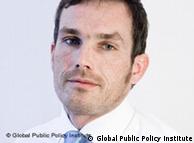OPINION | 08.07.2011
Berlin should lead by example to help South Sudan
Thorsten Benner is co-founder and associate director of the Global Public Policy Institute (GPPi) in Berlin. He is a co-author The New World of UN Peace Operations: Learning to Build Peace? (Oxford University Press 2011).
On Saturday South Sudan declares its independence marking the break-up of Africa's largest country.
On Wednesday next week German Foreign Minister Guido Westerwelle will preside over the UN Security Council session that will recommend the new nation for admission as the UN's 193rd member. Westerwelle wants to help establish "two stable Sudanese states living in peaceful co-existence" - a very ambitious goal given the realities on the ground.
South Sudan does not a have functioning public administration, police or judicial systems. Its health and education indicators are among the worst in the world. The country is full of arms and not yet demobilized fighters. Its army is oversized and undisciplined.
Long list of problems
Tax revenue is negligible - the budget relies on oil revenue and aid. The new capital Juba is a provincial outpost without any tradition of urban life. The road network in the country the size of the Iberian Peninsula is bad. The new nation lacks a unifying and forward-looking narrative that would unite the many different ethnic groups.
On the contrary: there is a simmering civil war within South Sudan between groups who were on different sides in the conflict with the North. In addition, there are many local conflicts over cattle, land and the power of ethnic groups. In 2011 alone so far, more than 1,600 people have been killed due to internal conflicts in South Sudan - many more than in the Darfur region.
Relations with the North remain tense. Many issues related to the critical border regions remain unresolved and have contributed to an increase in hostilities over the past month. At the same time, the Southern Sudanese government faces a population which expects a quick peace dividend.
For many in the government which is largely comprised of former rebel fighters from the SPLM/A independence means paying a peace dividend to themselves and their extended personal networks. To this end, the SPLM/A seeks to cement its control over the levers of power and resources instead of allowing for democratization. Some exceptions notwithstanding, South Sudan is lacking a political elite that cares for the public good rather than personal privileges.
In a nutshell: All ingredients are in place for South Sudan to become a failed state.
Lofty goals for UN mission
That would turn this new state into a security risk not just for its own population that has already gone through decades of suffering but for the region at large. To prevent this from becoming reality a new UN peace operation (UNMISS) headed by Hilde Johnson of Norway is tasked with assisting the new government to build a viable state as well as helping to protect civilians.
The mandate of the mission is long and lofty: security sector reform, police and judicial reform, demobilization and reintegration of combatants, human rights, HIV/AIDS and election support to name just a few planks of the operation.
Lack of resources and political will
Unfortunately, this laundry list of goals is not backed up by the necessary resources. The 7,000 UN troops, the so-called blue helmets, will lack critical logistical (e.g. helicopters) and intelligence (satellites, drones) capabilities, let alone defensive capacities (e.g. the kind of helicopters that made a big difference in Coté d'Ivoire).
In addition, many troop contributors won't allow their soldiers from intervening in military hostilities, thus effectively relegating them to the role of mere bystanders (as seen in Abyei and South Kordofan in recent months). This is partly a result of Western governments refusing to contribute to UN missions in Africa, partly a function of the host governments' blocking of intelligence capabilities for the mission.
On the civilian side, the mission (like many others) lacks a sufficient pool of police and judicial experts as well mediators that can help tackling the many localized conflicts far from the capital.
Leading role for Berlin
Germany should lead by example and within a European framework increase its military and civilian contribute. Right now, Berlin plans to deploy only 50 soldiers for the new mission.
Germany should also push for a stronger coordination of the flood of assistance activities on the ground. For the future of South Sudan it will be crucial that the mission and the donor community find a clear and decisive voice toward all conflict parties and their transgressions of which we can expect many.
What's more, Berlin during its current presidency of the UN Security Council should also push for realistic goals for the mission in South Sudan. In late 2010, Westerwelle talked about "good enough governance" as a revised goal for Afghanistan.
This formula could also serve as a template for the South Sudan mission. A lot will have been gained if in 10 years time there are two reasonably functional Sudanese states whose elites have started to provide public goods for their citizens.
Editor: Michael Knigge/Rob Mudge
dw


No comments:
Post a Comment